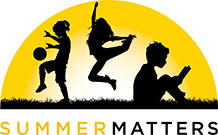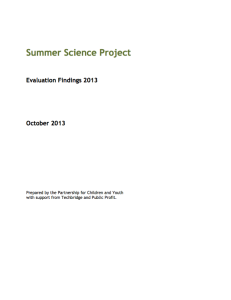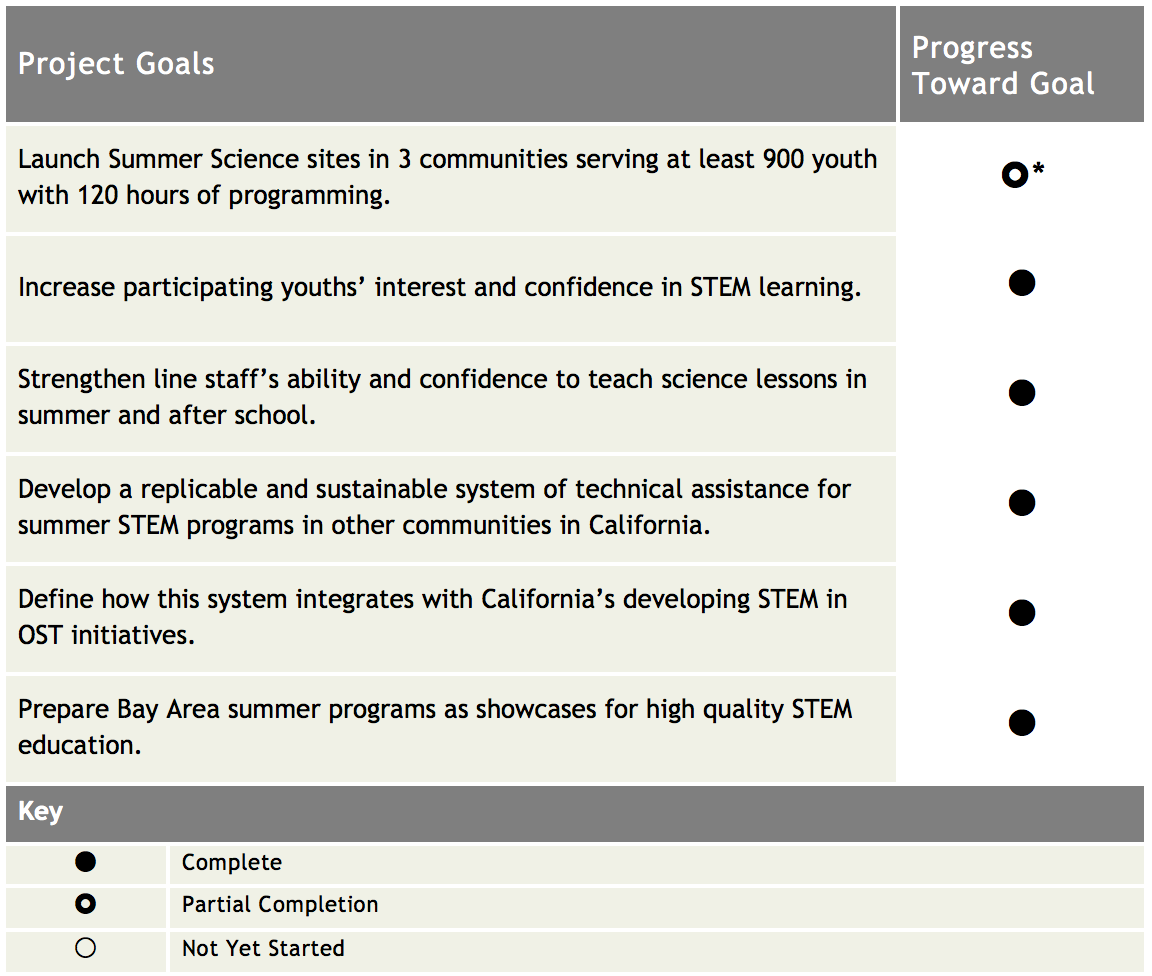Summer STEM Project
Evaluation Findings 2013
About the Summer Science Project
The Summer Science Project supports the availability and quality of summer and science, technology, engineering, and mathematics (STEM) learning programs in Oakland, Concord, San Jose, and California. The project is led by the Partnership for Children and Youth (PCY) and Techbridge, in collaboration with three project communities to include Oakland, Mt. Diablo, and Franklin-McKinley Unified School Districts. Summer Science combines the resources and experiences of PCY’s Summer Matters Campaign and Techbridge’s informal STEM education curriculum to build the capacity of out-of-school time staff to lead hands-on summer and science programming for 3rd-5th grade youth. Through this initiative, project communities receive hands-on curriculum, professional development, and coaching around best practices to engage youth in summer and STEM. .
Programmatic Elements
The Summer Science Project supported summer STEM programming through:
- Training: From fall 2012-spring 2013, PCY and Techbridge conducted a series of Summer Quality and STEM professional development. This series included four trainings (16 hours) of STEM specific training for program staff at Oakland, Mt. Diablo, and Franklin-McKinley School Districts. These trainings addressed teaching strategies that promote inquiry-based, hands-on STEM.
- Coaching: On average, each project community received up to 80 hours of district and/or site-based coaching in the months leading up to and following summer programming. Coaching focused on best practices to engage youth in high-quality summer and STEM programming and ranged from providing resources to co-facilitating summer training. In summer 2013, PCY and Techbridge trained onsite certificated teachers to serve as STEM Coaches for participating program staff. Site-based coaching is an integral component in ensuring that line staff feel confident, prepared, and able to lead high-quality STEM programming in summer. STEM Coaches were, in most cases, onsite daily to provide instructional coaching and assistance with the preparation and delivery of STEM lessons. Coaching also included one or two formal observations of each staff member leading an informal STEM activity. All observations were accompanied by a debriefing session to review written feedback based on the STEM coaching rubric.
- Quality Assessment: Quality coaching in spring 2013 was followed by onsite quality assessment site visits utilizing the Comprehensive Assessment of Summer Programs (CASP) Site Observation Tool. During the summer session, coaching continued on a monthly basis to include debrief sessions to review written observation feedback, program evaluation, and goal setting for 2014 summer planning.
Partner Agencies
The Summer Science Project was a collaborative project of:
- Partnership for Children and Youth (PCY): In 1997, a group of concerned government, philanthropy and business leaders decided to do something about the persistent poverty and barriers to success faced by children and youth in Bay Area communities. The Partnership for Children and Youth was created to connect schools and their community partners in these underserved communities with available public and private resources, and to improve the effectiveness of funding streams and services for low-income children. PCY works around three key initiatives: Expanded Learning, Community Schools, and Policy and Advocacy. PCY ignites systems of collaboration, leadership and continuous learning among school districts, government agencies and community-based organization serving low-income children and youth by supporting community school, after school and summer partnerships through training, assessment, planning, policy and advocacy.
- Techbridge: Founded by Chabot Space & Science Center with support from the National Science Foundation, Techbridge was launched in 2000 to expand the academic and career options of girls and to help increase the representation of women and underrepresented youth in STEM. Building on 12 years of success, Techbridge spun off as an independent nonprofit organization in 2011. Techbridge has reached over 4,000 girls in the Bay Area through after school and summer programs for girls that offer innovative hands-on projects, role models and worksite visits, and academic and career guidance. Through partnering with school districts and community-based organizations, Techbridge has helped engage thousands more girls and boys in STEM.
- Oakland Unified School District After School Programs Office: The OUSD After School Programs Office oversees 76 state and federally funded elementary, middle and high school programs, supporting the implementation of quality academic and enrichment expanded learning time programs in close partnership with 15 community organizations to over 16,000 children and youth over the course of the school year.
- Mt. Diablo CARES: Mt. Diablo CARES administers elementary, middle and high school programs at 16 school sites with support from 23 community partners. The program is the result of an ongoing collaboration between the Mt. Diablo Unified School District, City of Concord Parks & Recreation, and Bay Area Community Resources. CARES is supported by several funding sources including grants from state and city initiatives.
- Franklin-McKinley School District/ Washington United Center: Franklin-McKinley includes 19 schools that serve over 10,000 elementary and middle school students. In partnership with the CORAL (Communities Organizing Resources to Advance Learning) after school program of Catholic Charities of Santa Clara County, Franklin-McKinley offers literacy, resiliency, and enrichment activities with support from state and foundation initiatives and funding. CORAL also provides after school programming at Washington United Youth Center in San Jose, offering homework club, sports and cultural activities. Catholic Charities of Santa Clara County has been serving individuals and families for more than 50 years.
Participating Sites
In summer 2014, Summer Science programming was implemented at the following elementary schools:
Mt. Diablo Unified
- Cambridge
- Delta View
- El Monte
- Fair Oaks
- Ygnacio Valley
Oakland Unified
- Allendale
- East Oakland Pride
- Fruitvale
- Global Family Sobrante Park
Franklin-McKinley/ San Jose Unified
- Robert F. Kennedy
- Cornerstone Academy
Summer Science Project Goals
The Science Project has 6 established goals. Available evidence suggests that the project completely met five goals and partially met one goal. For goal 1, we expect to continue progressing in this area by maximizing and/or locating additional resources to provide more hours of programming to project communities of need. Public Profit assisted in the analysis of staff and participant surveys to measure progress on goals 2 and 3; these goals were completely met according to available evidence. Further detail on data sources is in Appendix A of this report. Table 1: Progress toward project goals
Acknowledgements
Prepared by the Partnership for Children and Youth with support from Techbridge and Public Profit.





